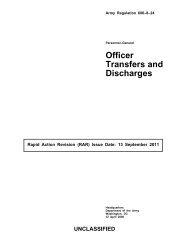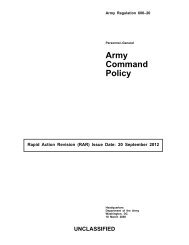Patient Administration - Army Publishing Directorate - U.S. Army
Patient Administration - Army Publishing Directorate - U.S. Army
Patient Administration - Army Publishing Directorate - U.S. Army
Create successful ePaper yourself
Turn your PDF publications into a flip-book with our unique Google optimized e-Paper software.
(2) Deposits and requests for checks will be made through the MSA. A separate deposit slip and collection voucher<br />
will be used for each patient.<br />
(3) The chief of PAD will ensure the security of the PTF by periodically reviewing internal controls and SOPs. On a<br />
random monthly basis, the chief of PAD will assign a disinterested third party to audit the PTF.<br />
b. Valuables. Valuables will be placed in a safe or other container or room which provides the same degree of<br />
protection.<br />
c. Loss of funds or valuables. When a shortage in the funds or a loss of property is discovered, the matter will be<br />
investigated and disposed of according to AR 15-6. When losses of funds are not recoverable and it has been<br />
determined that there was no fraud, dishonesty, or willful misconduct and no one is held pecuniarily liable, the fund<br />
should be liquidated and a claim initiated against the Government according to AR 27-20.<br />
12–7. Forms<br />
DA Form 3696, DA Form 3983 (<strong>Patient</strong>s’ Trust Fund Authorization for Deposit or Withdrawal of Funds and<br />
Valuables), DA Form 4128, and DA Form 4665 (<strong>Patient</strong>s’ Trust Fund—Daily Summary Record) will be used to record<br />
deposit and withdrawal of funds and valuables and central PTF accountability. DA Form 3983 and DA Form 4665 are<br />
available on the APD Web site (www.apd.army.mil).<br />
12–8. Procedures upon admission<br />
When admitted to the hospital, the patient will be informed that the hospital assumes no liability or responsibility for<br />
the loss of funds or valuables not placed in deposit. If the patient desires not to make a deposit, DA Form 3696 will be<br />
prepared and the statement block indicating that no deposit is desired will be signed by the patient or witnessed, if the<br />
patient is unable to sign, the form will be forwarded to the custodian. This procedure need not be utilized by those<br />
facilities that have established other means of recording the patients’ desire to not use the PTF.<br />
12–9. Audit<br />
The PTF will be audited annually and at any other time deemed appropriate by the MTF commander.<br />
Chapter 13<br />
Injury and Illness Cases-Medical Affirmative Claims<br />
13–1. General<br />
a. Purpose.<br />
(1) The Federal Medical Care Recovery Act, 42 USC 2651-2653, established the U.S. Government’s independent<br />
right to recover the reasonable value of health care services provided at Government expense to an individual as a<br />
result of an injury or illness incurred under circumstances creating a tort liability upon some third person.<br />
(2) 10 USC 1095 provides authority for military health care facilities to collect the reasonable costs of health care<br />
from health insurance and Medicare supplemental policies. 10 USC 1095 also authorizes the United States to recover<br />
from automobile liability, medical payments, and personal injury protection or no-fault insurance. This chapter<br />
establishes procedures in support of medical affirmative claims.<br />
b. Applicability. The provisions of this chapter do not apply to battle casualties or to claims between Federal<br />
agencies.<br />
c. Recovery judge advocate (RJA). The term “RJA” as used in this chapter means the legal advisor in the Office of<br />
the SJA assigned responsibility for asserting a medical affirmative claim. The RJA normally will work in the<br />
designated judge advocate office that furnishes legal services to the <strong>Army</strong> hospital that provided the initial treatment or<br />
hospitalization of an injured person entitled to medical care at <strong>Army</strong> expense. This is generally the judge advocate or<br />
legal advisor of the command or installation supporting the <strong>Army</strong> MTF. Geographic areas assigned to an RJA generally<br />
coincide with the geographic areas assigned to MEDDAC/MEDCEN commanders. The designated RJA is responsible<br />
for asserting, pursuing, and settling claims arising from an injury or illness as a result of a recoverable accident or<br />
incident. In cases where more than one treatment facility provides medical care to a beneficiary, the responsibility for<br />
recovery may be transferred to another claims office, depending on which office has the most significant interest in a<br />
particular claim (AR 27-20 and DA Pam 27-162).<br />
d. Medical affirmative claim. A medical affirmative claim is a claim-other than a health insurance claim-asserted in<br />
favor of the United States, for the reasonable value of health care services furnished at Government expense. These<br />
claims include, but are not limited to, claims asserted against automobile and motorcycle insurance, including personal<br />
injury protection and medical payment coverage, or uninsured/underinsured provisions; homeowner’s or renter’s<br />
policies; products, premises, or general liability policies; and worker’s compensation (on-the-job injury) funds. These<br />
claims were previously referred to as third party liability (TPL) claims and are commonly referred to as Federal<br />
Medical Care Recovery Act claims.<br />
e. Health care services. The term “health care services” includes all medical care furnished by or at the expense of<br />
AR 40–400 27 January 2010<br />
81
















